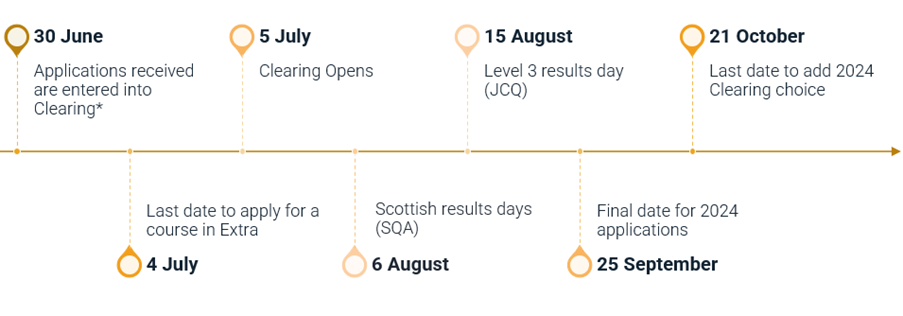What is clearing? A guide to advising international students
Some students applying to university in the UK may find themselves going through clearing. These are the main things you need to know about clearing to be able to advise them through the process

Created in partnership with

Created in partnership with

What is clearing?
Clearing is a process that runs from 5 July and helps students without a confirmed university place and those who applied late to find courses where places are still available. It’s a great way to explore options, and it’s available to everyone who has made an application. Find out more here.
Who might use clearing?
There are five kinds of students who might use clearing. See which of these might match up to the students you’re supporting.
Direct to clearing – Students who haven’t yet applied in the cycle. They haven’t submitted an application in the UK before 5 July.
Mind changers - A student who has declined the offers they were holding as they changed their mind about the course they wanted to study or the university they wanted to go to.
Disappointed with results – A student who unfortunately did not achieve the grades needed to get a place with their firm or insurance choice and now wants to explore other options.
No offers – A student who applied in the main admissions cycle but either did not receive an offer or declined the offers they received and is still looking for opportunities.
Trade-ups – A student who achieved higher grades than expected, which has opened more opportunities for them. They are considering declining the place they are holding to assess their options.
How does clearing work?
If they are eligible for clearing, your student will get a clearing number in their UCAS application (under application status). They can then follow these steps to make the most of the process.
Research vacancies – Visit the UCAS website and explore the clearing pages and use the search tool from July. If your student is still looking for the same course, they can do this. However, they might also want to be a bit creative and consider similar programmes, for example joint honours or a variation of a business programme. Some students using clearing may be exploring completely different options or looking for the first time, and so might need the same level of support that applicants needed earlier in the year.
Contact universities to discuss – Get in touch with universities via phone to discuss the qualifications your student holds. This is particularly important for students with international qualifications, who need to understand how their qualifications will “translate” to the UK grades universities are looking for. Universities will normally provide a “verbal offer” if the student’s grades meet the requirements. International students may need to send a copy of the qualification they are taking to the university before a verbal offer can be given. It’s a good idea to check university entry requirements before calling.
Enter choice – Only once the student has had a clear offer can they then add one choice only into their UCAS application. Offers are normally valid for a set period, so make sure that your students understand if there is a deadline to add the choice to their application.
University or college considers applications – The university will still need to consider the whole application before being able to finalise the offer through UCAS. If your student has spoken to the institution and been honest about the grades they achieved, they are more likely to be placed at the university (this can take a bit of time to show on the UCAS system).
Placed on course – Once the student is placed, they can begin the process of arranging other things such as visas and accommodation.
Find out more about how clearing works
Timeline

For international students, many universities will have their own internal deadlines for applications to ensure that students are able to secure visas in time. Make sure that your students check with the universities and try to apply through clearing as early as possible.
Supporting your students
As a counsellor, understanding the reason your student is using clearing is key to knowing how to support them – as we mentioned earlier, for some students, it may be a little disappointing that they didn’t achieve the grades they expected, while for others it’s an exciting opportunity that they chose to participate in.
You know your students best and will be able to give them the emotional support needed. The common factor among all students in clearing is that they’re completing the process of finding and accepting a place in a shorter time frame, so organisation and clear guidance are key.
A great way to do this is talking to your students about the “what ifs” in advance of receiving their results. This will make them (and you) feel more in control of the decisions made, rather than your student panicking and rushing.
A good starting point is to go back over other courses or institutions that were considered earlier in the application process and have a bit of a refresh – perhaps it’s something that your student originally thought was out of reach but now is a good option. It’s also a great idea to get them to chat to current students using Unibuddy to see if an institution comes up that they hadn’t previously considered.
Some universities will lower their entry requirements later in the cycle after UK results are released, so if you have a student who is struggling with options it might be worth looking again after these grades are released.
Top tips for international students
Be aware of time zones and what they mean for when an institution’s phone lines open and close. Your student may need to get up early or stay up late depending on where in the world you’re based.
Typically, international results are released ahead of the August results in the UK, so your students may be able to make a start on the clearing process a little earlier. This means that if your student can’t find the perfect course for them when clearing opens in July, there will normally be a lot more availability of courses once UK results are released, so encourage them to keep looking.
If you’re sending documents to a university and the original transcript isn’t in English, make sure that you’ve also sent a certified translation.
In clearing, the grades that universities are asking for may be advertised either in A-level grades, tariff points or IB scores. If your student hasn’t studied one of these qualifications, make sure that they are clear about what grades they have and what the qualification is when they speak to someone on the phone.
Most international students are still able to arrive for the start of term if they apply through clearing. However, if they are applying later in the cycle and require a visa, make sure that they know the visa wait times in your country and ask the university about latest date of arrival. There are fast-track visa options available, and some universities may require students to commit to getting a fast track if they are applying particularly late or from a country with a slower visa process. More information on visas can be found here.
Universities want to speak to the student, so if you or the student’s family are supporting a phone call, make sure the student is there with you. Also make sure that your student has all the necessary information with them before calling.
Some universities will hold rooms in accommodation for students who join through clearing, so it’s always worth checking with them first. But if that is not an option, there are private accommodation providers in most cities, and the accommodation team at the university should be able to direct your students towards these.
Find more information specifically for international advisers
There is lots of support on our clearing pages that you can use in lessons with your students. Please also remember that because UK students receive results at set times, the UCAS systems won’t be updated during our embargo dates – if possible, try to get ahead of these dates. Find out more about the embargo dates.



